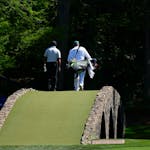 See
more of the story
See
more of the story
AUGUSTA, GA. – His father had waited for him there in 1997, had flown despite a heart condition and doctor's orders, had flown to Augusta to see his son become the first black man to win a major championship, at a golf club with a history of discrimination. Earl Woods waited by the 18th green at Augusta National and hugged his son and golf changed forever.
His children were waiting for him there on Sunday, were making their first visit to the Masters, and were for the first time watching their father play like a champion, like the man they had seen on old videos and endless commercials. Sam and Charlie waited by the 18th green at Augusta National and hugged their father and Tiger Woods' story changed, again and forever.
Twenty-two years after he became the first black man to win a major championship and 14 years after he last won the Masters, Woods on Sunday completed what might be the greatest comeback in sports history by winning his fifth green jacket. When defending champion Patrick Reed slipped this one over his shoulders in the Butler Cabin, Woods grinned and said, "It fits."
Woods' shoulders are broader today than when he won in 1997, but even his snug collarless shirts and weightlifter's physique can't obscure his parade of vulnerabilities.
In 2008, he won the U.S. Open while limping on a shredded knee. He has undergone a series of knee and back surgeries, been embarrassed by scandal and succumbed to chipping yips — perhaps the clearest threat to his career.
Woods' children called him "The YouTube Golfer," because only on the internet could they find evidence of his greatness. He would try to swing a golf club and collapse. He would whisper to friends that he might never win again, and they would believe him.
"I think the kids are starting to understand how much this game means to me and some of the things I've done in this game," he said. "Prior to this comeback, they only knew that golf caused me pain. If I swung a club, I ended up on the ground."
Sunday afternoon, Woods shot a final-round 70, then displayed an emotion he has rarely shown: joy. He tapped in for a bogey on the 18th green to win the Masters by one stroke over three pursuers, then exulted — not in the fist-pumping expression of dominance that became his trademark, but with a more spontaneous and cathartic reaction.
He raised his fists, hugged caddie Joe LaCava, walked off the green and saw his son, Charlie, wearing a backward cap and a Nike T-shirt. Woods hugged Charlie and his mother and then his daughter, Sam, who had flown in after her soccer team was eliminated from a Florida tournament.
He kept hugging friends and relatives and foes all the way to the clubhouse. At a packed news conference, he tried not to cry.
"My dad's no longer here, but Mom's here, 22 years later, and I happen to win the tournament," Woods said. "Then to have both Sam and Charlie here — they were there at the British Open last year when I had the lead on the back nine, and I made a few mistakes, cost myself a chance to win the Open title.
"I wasn't going to let that happen to them twice."
Woods had never won a major when trailing entering the final round. When he teed off on Sunday, he trailed Francesco Molinari, who beat him at the British Open, by two strokes.
His comeback may rank as the greatest in sports history. Ben Hogan recovered from severe injuries in a car wreck to win the U.S. Open. Muhammad Ali regained his world title after a seven-year lapse. Michael Jordan returned from a failed baseball career to win three NBA titles.
Woods' comeback is more stunning because of the sheer number and variety of debilitating challenges he faced. "I had serious doubts after what transpired a couple years ago," he said. "I could barely walk. I couldn't sit. Couldn't lay down. I really couldn't do much of anything.
"Luckily, I had the procedure on my back, which gave me a chance at having a normal life. But then all of a sudden I realized I could actually swing a golf club again. I felt I could somehow piece this together, that I still had the hands to do it."
Woods seemed different all week — more optimistic about winning, more appreciative that he could compete. On Wednesday night, the Golf Writers Association of America gave him the Ben Hogan Award for playing despite ailments. In his acceptance speech, Woods acknowledged that he required shots to his back to attend the Masters' champions dinner two years ago, and that he feared he may never play again.
On and around Augusta National, Woods for the first time eagerly slapped hands with fans, instead of maintaining his famous thousand-yard stare. He's learning to say hello because he thought he might have to say goodbye.
"I was very fortunate to be given another chance to do something that I love to do," he said. "But more importantly, I've been able to participate in my kids' lives in a way that I couldn't for a number of years."
Sunday, Charlie and Sam stood in for Earl.
"I hope they are proud of me," Woods said. "I hope they are proud of their dad.''




